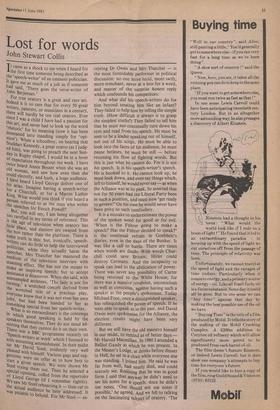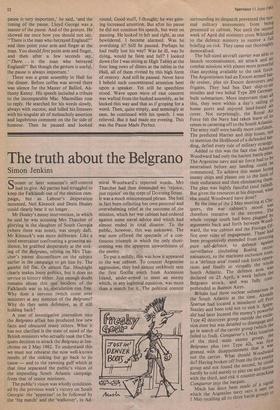Lost for words
John Stewart Collis
It came as a shock to me when I heard for the first time someone being described as the 'speech-writer' of an eminent politician. It gave me as much of a jolt as if someone had said, 'There goes the verse-writer of John Betjeman.' For true oratory is a great and rare art. Indeed it is so rare that for every 50 great writers, painters, or musicians in a century, there will hardly be ten real orators. Ever since I was a child I have had a passion for this art, and never had to look up the word `rhetoric' for its meaning (now it has been demeaned into standing simply for 'opi- nion'). When a schoolboy, on hearing that Studdart Kennedy, a great orator (as I judg- ed him), was going to preach the next Sun- day in Rugby chapel, I would be in a fever of expectation throughout the week. I have twice heard Annie Besant when she was an old woman, and saw how even then she could electrify, and hush, a huge audience. I have heard Lloyd George deliver one of his arias. Imagine having a speech-writer for a Churchill, or for a Martin Luther King. What would you think if you heard a person referred to as the man who writes the speeches for Enoch Powell? But, you will say, I am being altogether too rarefied in my terms of reference. This is the age of television when oratory has little place, and electors are swayed from the box rather than the platform. There is some truth in this: but, ironically, speech- writers can do little to help the interviewed politician, while they actually harm the speeches. Mrs Thatcher has mastered the medium of the television interview with stunning effect. She has not the means to make an inspiring speech: but to accept assistance is disastrous. When she said, with unexampled archness, 'The lady is not for turning,' a wretched conceit derived from the wretched title of a precious play, e. veryone knew that it was not even her own' Joke, but had been handed to her as something special from her speech-writer. What is -so extraordinary is the contempt in which good speaking is held by the speakers themselves. They do not mind ad- mitting that they cannot do it on their own. T, here was a BBC programme recently on Speech-writers at work' which I listened to with mounting astonishment. In their midst sat Mr David Steel, evidently very well pleased with himself. Various gags and sug- gestions were on offer as to how best to start a given speech. We were shown Mr Steel trying them out. Then he selected a special opening, culled from the repertoire of Lloyd George (if I remember rightly). We saw Mr Steel rehearsing it — then cut to the actual audience he later addressed. It was pitiable to behold. For Mr Steel — ex-
cepting Dr Owen and Mrs Thatcher — is the most formidable performer in political discussion: no one more lucid, more swift, more trenchant, never at a loss for a word, and master of the surprise honest reply which confounds his competitors.
And what did his speech-writers do for him beyond treating him like an infant?
They failed to help him by telling the simple truth. (How difficult it always is to grasp the simplest truths!) They failed to tell him that he must not continually turn down his eyes and read from his speech. He must be seen to be a leader speaking out of himself, not out of his script. He must be able to look into the faces of his audience, he must pause betimes, he must be still — before resuming his flow of fighting words. But this is just what he cannot do. For it is not his speech. It is his speech-writer's speech. He is hooked to it. He cannot look up, he must look down, and even say things which, left to himself, he would never say as when the Alliance was at its peak, he asserted that not for 50 years had the Liberal Party been in such a position, and must now 'get ready to govern! 'On his own he would never have been privy to such tomfoolery.
It is a mistake to underestimate the power of the spoken word for good or for evil. 'When is the Fiihrer going to make a speech? Has the Ftihrer decided to speak?' is the continual refrain in Goebbels's diaries, even in the days of the Bunker. It was like a call to battle. There are times when words are deeds. With words Chur- chill could save Britain; Hitler could destroy Germany. And the incapacity to speak can lead to the abdication of power. There was never any possibility of Carter being returned to the White House; for there was a massive revulsion, unconscious as well as conscious, against having such a speaker as the people's spokesman. Today Michael Foot, once a distinguished speaker, has relinquished the power of speech. If he were able to speak as in the past, and David Owen were spokesman for the Alliance, the election results might have been very different.
But we still have the old maestro himself in our midst, to remind us of better days Mr Harold Macmillan. In 1980 I attended a Balliol Gaudy at which he was present. In the Master's Lodge, at drinks before dinner in Hall, he sat in a chair while everyone else was standing. 1 joined him. He said he was far from well, had nearly died, and could scarcely see. Realising that he was in good form I said that anyway he didn't need to see his notes for a speech, since he didn't use notes. 'One should not use notes if possible,' he agreed. And we fell to talking on the fascinating subject of oratory. 'The pause is very important,' he said, 'and the timing of the pause. Lloyd George was a, master of the pause. And of the gesture. He showed me once how you should not say, "There is the man who betrayed England!" and then point your arm and finger at the man. You should first point arm and finger, and then after a few seconds say, "There. . . is the man who betrayed England!" But though the gesture is useful, the pause is always important.'
There was a great assembly in Hall for the dinner. Before coffee was served there was silence for the Master of Balliol, An- thony Kenny. His speech included a tribute to the incomparable Mac. Macmillan rose to reply. He searched for his words slowly, always with success, and lulled his listeners with his singular air of melancholy assertion and lugubrious comment on the far side of humour. Then he paused and looked
round. Good stuff, I thought; he was gain- ing increased attention. But after his pause he did not continue his speech, but went on pausing. He looked to left and right, as one bewildered. I became alarmed. Was he overdoing it? Still he paused. Perhaps he had really lost his way? Was he ill, was he dying, would he faint and fall? .1 looked down (for I was sitting at High Table) at the four long rows of diners at the tables in the Hall, all of them riveted by this high form of oratory. And still he paused. Never have I beheld such concentrated attention bent upon a speaker. Yet still he speechless stood. Wave upon wave of vast concern was wafted from the hushed assembly, as he looked this way and that as if groping for a word. Then, quite simply, and seemingly at ease, he continued with his speech. I was relieved. But it had made my evening. This was the Pause Made Perfect.











































 Previous page
Previous page